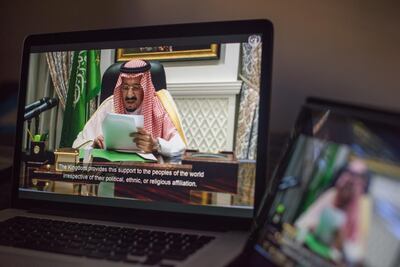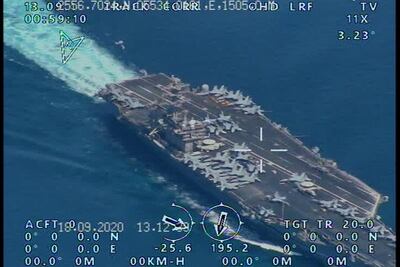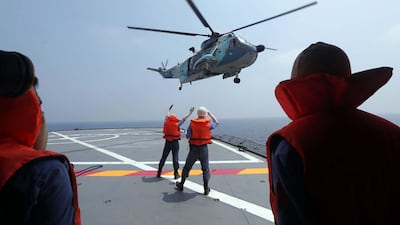In dealing with Iran’s rogue regime, the Trump administration has shown clear and decisive leadership on the world stage. Unfortunately, Europe has not helped the American cause by taking a more nuanced position vis-a-vis Tehran, particularly its nuclear programme. China and Russia, the other major global powers, have thrown in their lot with the regime.
It is not surprising, therefore, that the US did not wait for the UN Security Council to reconvene on October 18 to push for an extension of the arms embargo in place against Iran (they will expire the next day). Instead, it proceeded to impose new sanctions using the "snapback mechanism" that allows it to pass punitive measures against Tehran for its failure to abide by its 2015 nuclear deal commitments. Now, China and Russia will be readying themselves for US sanctions against them, if and when they resume selling arms to Iran after October 18.
At the UN General Assembly this week, Saudi Arabia's King Salman urged the international community to deter Iran's expansionist policies in the region. He stressed the need to disarm Hezbollah, the Lebanese militia that is funded by Tehran and wields political clout in Beirut, for Lebanon to be able to function like a normal country. True, the ancient nation of Iran has an important role to play in the region, but the 41-year-old Islamic Republic has no right to destroy the sovereignty of Arab countries, as it has done in Iraq, Lebanon and Syria, with the help of its proxies in those countries.

Deterring Iran should not simply be a Saudi or Arab demand, however. The UN should restore some of its moral authority by stopping the appeasement of the regime. The European Union, in particular, has an obligation to stand up to Iran for its transgressions in Lebanon, which have led to a months-long political impasse and economic stagnation. The bloc must now rekindle its political, humanitarian and even pragmatic instincts, and support the American pressure campaign against the regime.
If, however, the EU has shown itself to be weak and short-sighted, that is because it lacks significant geopolitical heft.
This much was obvious from my conversation with Danilo Turk, the former president of Slovenia, during the 15th e-policy circle of the Beirut Institute Summit in Abu Dhabi. “The European Union is not well prepared for such a [significant geopolitical] role,” Mr Turk pointed out. “The global tendencies are simply too strong and require a higher degree of coherence in European Union, something that is not attainable in the short term.”
He is right. The EU, which is essentially a 27-nation grouping, is unable to reach a consensus on a number of issues, domestic or foreign. The European Council leaders were due to meet in Brussels on Thursday and Friday to discuss the continent’s relations with some of its neighbours. But it was reportedly postponed by a week, as it seeks to overcome gaping divisions on many issues. It is neither able to exercise absolute sovereignty nor make collective decisions that are coherent.

“One has to be really quite careful in not expecting too strong of a geopolitical role from the European Union,” Mr Turk said, “although it will be a very important player in development in a more or less general political discussion on the world.”
Germany, the current president of the EU, is in an unenviable position on matters pertaining to both Russia and Iran. But while Berlin has chosen to be tough with Moscow over the alleged poisoning of one of its dissidents, it has so far shown leniency towards Tehran.
Iran, meanwhile, continues to recklessly escalate tensions in the Middle East, showing little regard for the sovereignty of smaller nations and the safety and well-being of their citizens.
This week, the Islamic Revolutionary Guard Corps inaugurated a naval base in the Strait of Hormuz that took six years to build. IRGC commander Major General Hossein Salami said that the base is expected to enhance Iran's naval operations in the Gulf region, and monitor the entry and exit of naval assets from outside the region into the strait. His remarks came days after a US carrier group crossed the strategic waterway.
Iran is no doubt keeping an eye on US activity in a region, where the latter seems to have upped its game. Richard Fontaine, chief executive the Centre for New American Security, told me that the US currently has more troops in the Middle East than it had when Donald Trump was inaugurated as President in January 2017. He added that serious thinking is under way in Washington on how to develop its interests in the region, including its military presence, in a sustainable manner.
This is an interesting observation, and one that will worry Tehran, especially given all the talk going on in America about its hands being burned from its interventions in Iraq and Libya over the past couple of decades.
But as attention gets paid to the developments at sea, countries with weak governance systems also need support. Lebanon, for instance, is a victim of the international community’s appeasement policies towards Iran, with the latter refusing to account for its actions in the tiny country. And in this situation, it is not just China and Russia but also the EU that should think of the consequences of its policies and actions.
European powers seem all too ready to use Lebanon as a means to retaliate against Mr Trump’s withdrawal of the US from the nuclear deal with Iran. What they need to realise, however, is that at the heart of the deal lies a flaw: a fear of Iran’s nuclear ambitions that has led them to ignore the regime’s regional, expansionist projects and exclude them from the negotiations in the run-up to the 2015 agreement. And it is precisely this flaw that has empowered the IRGC to broaden the scope of its military adventures in the region.
Raghida Dergham is the founder and executive chairwoman of the Beirut Institute


